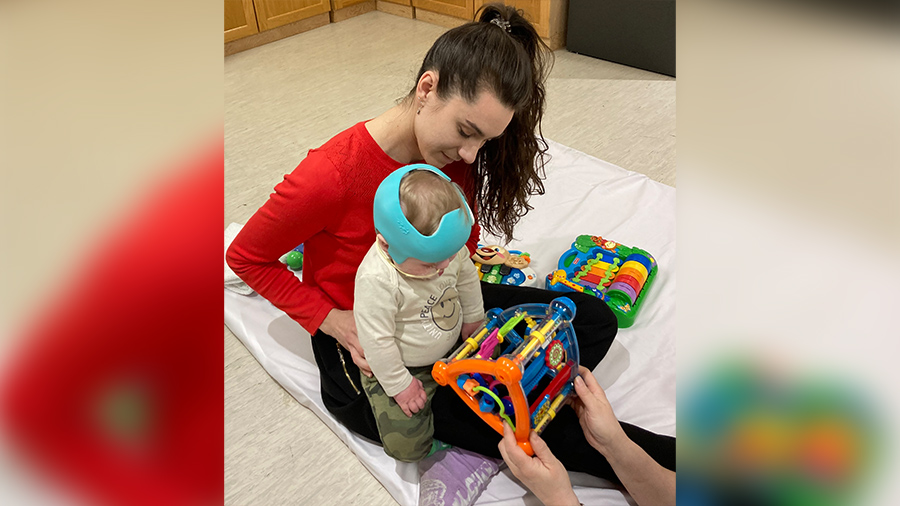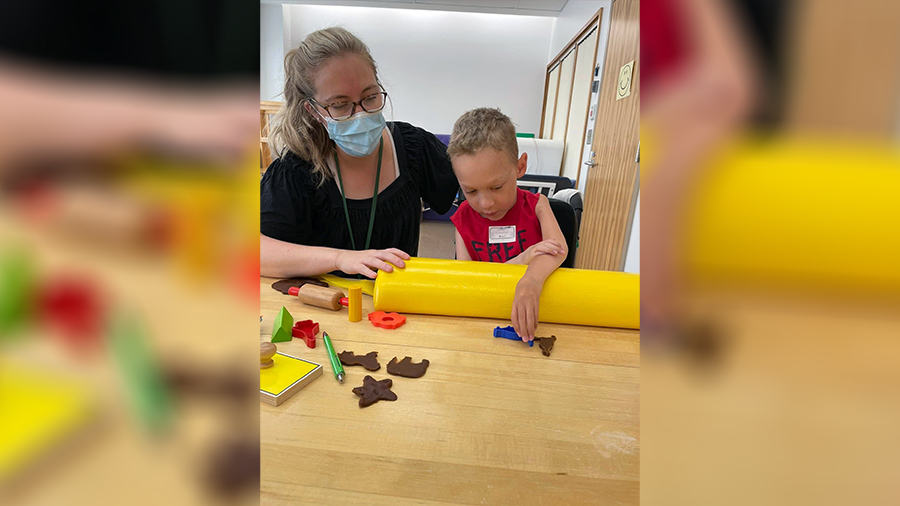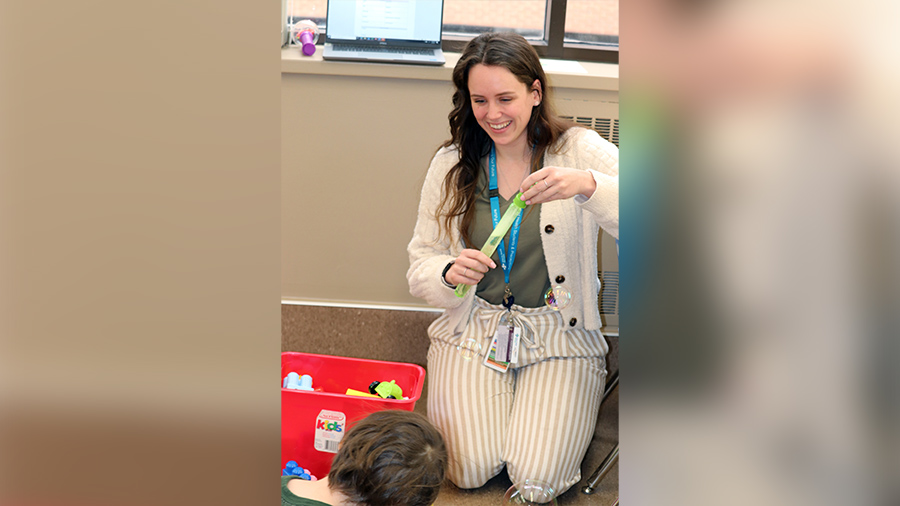
October 11, 2024

Ariana Dirk, a Children’s Allied Health pediatric occupational therapist (OT) at Medicine Hat Regional Hospital, helps her young clients focus on the skills they already have, giving them the tools, strategies and confidence to overcome barriers. Photo by Tricia Miller.

Pediatric OT Caitlin West guides families to engage in therapeutic activities as part of their regular activities, such as playing with toys, blowing bubbles or molding objects out of clay. Photo by Tricia Miller.

Pediatric OT Amanda Ball and her colleagues often work with busy families and come up with creative solutions that won’t add extra chores to a family’s to-do list. Photo by Tricia Miller.
Story by Kelly Morris | Photos by Tricia Miller
MEDICINE HAT — Pediatric occupational therapists (OTs) are changing the perception of therapy as a static, individual activity into fun that can be spun into the entire family’s day-to-day routines.
“People think therapy means we sit in a room with a child for an hour once a week, but our team recognizes that parents are the true experts of their children,” says Caitlin West, an OT with Children’s Allied Health at Medicine Hat Regional Hospital (MHRH).
“We’re giving them tools and strategies so the parents can support their child’s therapy every single day, sometimes without even knowing it, by adding these strategies into the day-to-day activities they’re already doing.”
OTs help people lead more productive, satisfying lives using tools and techniques to perform desired occupations — the actions and activities that people need or want to do during a day.
For West and her colleagues, Amanda Ball and Ariana Dirk, their pediatric clients’ occupations can range from everyday activities such as eating or brushing their teeth, to playing and heading out into the community. By tapping into a strength-based approach, they focus on highlighting the skills their young client’s already have, which gives them the tools, strategies and confidence to overcome barriers.
“I have a strong belief that we’re all capable of being our best selves and OTs enable people to do that,” says West. “There’s nothing broken about anyone in this world. Sometimes people see a diagnosis as a barrier, but instead we look at how can we maximize their strengths to help them do all the things they need and want to do.”
Dirk adds: “It’s not about changing the person, it’s about meeting them where they are at based on what skills they have — and how do we accommodate everything around them — so they can showcase those skills.” Often working with busy families, Ball, Dirk and West use creative, intentional solutions that don’t add extra chores to the family’s to-do list.
“The last thing we want to do is tell a busy mom, ‘Here’s five more things to do in your day’,” says West. “Instead, we ask what they’re already doing and determine how we can incorporate therapeutic activities into these tasks.”
Since every client has different interests, each case is another puzzle to piece together, and another unique situation with equally unique solutions.
“You have these foundational pieces, but you get to put them together. And the only way you get to do that is when you’re working with that client,” Dirk says enthusiastically. “Because only they have the answers for how those pieces need to fit together.”
As their puzzle pieces come together, confidence and comfort grow. Until then, these OTs find themselves in the role of cheerleader and support team. As many parents can attest, fear and guilt are often at play when seeking support for any perceived or real physical or developmental challenge.
“Sometimes it’s just validating that kids develop at different paces, but this is what we’re going to do now to support them and meet them where they’re at,” says Ball. “Sometimes it’s just making families feel like, ‘OK, I got this. It’s not something I’m doing wrong. I am doing everything I can’.”
The work is never boring — and no two days are the same.
“Working in OT, I don't think you'd ever be bored. There would never be a situation in which I'd be like, “Well, I've done it all,’ because you're constantly learning every day,” says Ball. “I love seeing kids and families notice the little changes.”
Joining families in celebrating their successes, whether small wins or big ones, is the highlight of these OTs jobs.
“Something that seems so simple — such as being able to feed yourself or brush your teeth independently — are things we take for granted,” says West. “And when you get to see how excited it makes a child and a family, what a big win it is, it's just so much fun to be part of that celebration.”
These OTs, however, prefer to shine the spotlight on their clients, and give them full credit for the wins.
“We’re in a really unique position where we get to give someone complete ownership over their successes,” adds Dirk. “I can give you tools and strategies and recommendations, but that person completely owns those successes, because they're the only one that can do that work.
“I think that's powerful for people to realize that they’re in that driver's seat — and that they’re the ones who made that happen.”
October is National Occupational Therapy Month, a time to recognize a unique profession that helps individuals in the activities and life roles meaningful to them. Around 1,200 occupational therapists at AHS provide services across a continuum of care for all ages.